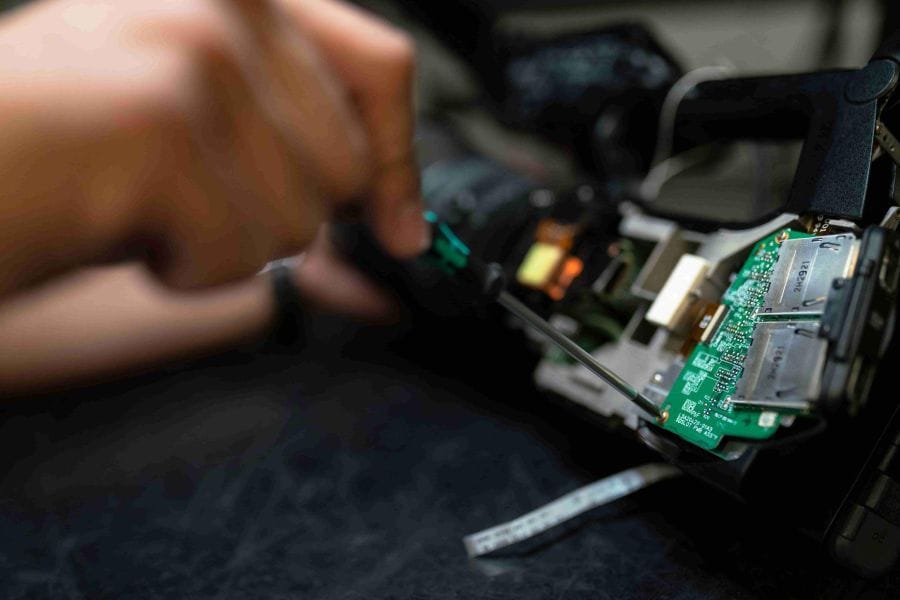How do you become a hardware engineer? What is a computer hardware engineer? Why choose this career path? Becoming a hardware engineer is a great choice, given our society’s increased technology and innovation. It’s a highly demanded job.
Note that a hardware engineer career offers access to the world of the high-tech industry, which is a rewarding job with flexibility and a challenging market. Becoming a hardware engineer can be a good choice for high potential earnings.
If you want to embrace a hardware engineering career path, here is everything you need to know to become a successful computer hardware engineer.
What is a Computer Hardware Engineer?
A computer hardware engineer’s main role is to design, develop, and test a computer’s components, such as processors, memory devices, printed circuit boards (PCBs), and more. The engineer collaborates with other engineers to ensure that components are optimized for performance and compatibility.
Key Responsibilities and Required Skills
- Design and Development: Create and develop new hardware systems and components
- Prototyping and Testing: Building prototypes and evaluating their performance through testing
- Problem Solving: Diagnostic the issue related to existing hardware and resolve it
- Essential Skills: Mastering hardware design tools, analytical thinking, and strong communication skills.
- Team Work: Work with software engineers to ensure a good connection between hardware and software components.
- Innovation: Continuous learning is needed to become a successful hardware engineer.
- Documentation: Preparing technical reports and presentations is a daily task for this role.
- Attention to Detail: A requirement for this position is to minimize errors and enhance reliability.
Anyone aspiring to become a computer hardware engineer should understand what is expected from this role to master all the skills and tasks for a promising career.
Career Impact
Becoming a hardware engineer can be the right path if you want to make a difference in the world through your work. Working on new generations of devices and systems can help industries like healthcare, automotive, robotics, ecologic, or technology that can revolutionize life for human beings.
Related Opportunities
If hardware engineering interests you, you might also want to consider paths like embedded systems engineering or quality assurance engineering. These positions are closely related.
Why Become a Computer Hardware Engineer?
A career after graduation as a hardware engineer offers many opportunities to work on projects that impact the future of technology. But why is this field in such high demand, and what makes it worth pursuing?

Why It’s in Demand
Between highly new technologies, AI, new smart devices, and cars, the world needs more hardware engineers to continue to expand. These professionals must guarantee a good connection between software innovation and hardware support.
Job Opportunities After Graduation
The tech industry is looking to hire skilled hardware engineers. This is a Highly Demanded role, and rising technology sectors like autonomous vehicles and renewable energy are creating even more specialized opportunities.
Inclusivity in Tech
Companies recognize the value of hardware engineers because they help them become innovation leaders. While it can be a challenging position, you will still work on high-tech projects using exclusive technologies, making this career path highly rewarding for individuals looking to become hardware engineers.
Steps to Become a Computer Hardware Engineer
The perfect recipe combines education, hands-on experience, and continuous learning to become a successful hardware engineer. Here are the proper steps to embrace this career path:
Education
Hardware engineers must have a bachelor’s degree in computer engineering, electrical or electronics engineering, or a related field. Universities often offer specialization courses in hardware design and computer architecture.
Experience
You’ll need to get your hands on it to gain experience. The best way to do that is to look for internships where you can develop your skills in hardware design, for example.
Upskilling
Consider certifications such as Cisco’s CCNA or CompTIA Server+ to boost your resume. Stay updated on the trends or emerging technologies to maintain a competitive edge.
How Long Does It Take to Become a Hardware Engineer?
Becoming a hardware engineer is about a four-year program, but additional internships and certifications may extend the timeframe.
Key Factors Affecting Duration
- Full-Time vs. Part-Time Studies: Part-time programs take longer but may suit transitioning professionals.
- Certification Requirements: Certifications can add months but enhance your qualifications and help you to get hired.
Building Skills for Success in Hardware Engineering
To be able to find a job as a hardware engineer, here are some tips to help you find your dream job:
Technical Writing
A sound hardware engineer has clear and strong communication skills for creating reports and presenting designs to the leadership. Writing, presentation, and teamwork skills are essential for success.
Job Hunting Strategies
Use online job platforms like LinkedIn and niche boards to find the best opportunities. Create your resume to highlight relevant coursework and projects.
Leveraging AI-Powered Tools
AI-driven job-matching platforms can help you identify the best roles based on your skills and interests. These tools streamline the job search process and ensure you take advantage of opportunities.
Using an AI tool to build a resume or your CV can help highlight your skills and education. A school-leaver CV template can be a good choice to showcase your abilities, even if you lack experience.
How Much Do Computer Hardware Engineers Earn?
Hardware engineers can earn competitive pay based on their skills and the value they bring.
Salary Expectations
- Entry-Level: Around $70,000–$85,000 annually in the U.S.
- Experienced Roles: Senior positions can exceed $120,000 per year.
Global Trends
Countries like the U.S., Germany, and Japan have high demand and are looking for new hardware engineers, particularly in sectors like IT and automotive.
Top-Paying Industries
Hardware engineers often find lucrative roles in tech-heavy industries such as aerospace, automotive, and consumer electronics.
Conclusion: Exploring Career Opportunities in Hardware Engineering
With the new technologies and rising innovations, companies are hiring more and more skilled hardware engineers. Becoming a hardware engineer can be the right career for you as you will be part of an innovative team, creating adapted component designs and ensuring the connection between the software and the component works well. In this field, you will have space for growth and development.
Industries like automotive, aerospace, healthcare, robotics, and many more need more talent, making the path of hardware engineering a high-demand job with the potential for high sales and job security. With dedication and hard work, you’ll be on your way to becoming a successful hardware engineer!
About Taletprise
Talentprise is an AI-driven career platform designed to help job seekers connect with top employers, especially fresh graduates, and professionals in technology-related fields like hardware and software engineering. Highlighting your skills, potential, and unique qualities, Talentprise ensures you stand out in a competitive job market. It simplifies your job search by matching you with roles that align with your expertise and career goals. Sign up for free today and let your talent shine!

Editorial Team
Our team is fueled by a passion for crafting valuable content that enriches the experiences of our users, customers, and visitors. We meticulously select meaningful and unbiased topics ranging from tips and guides to challenges and the latest in technology, trends, and job market insights. All curated with care and affection!








